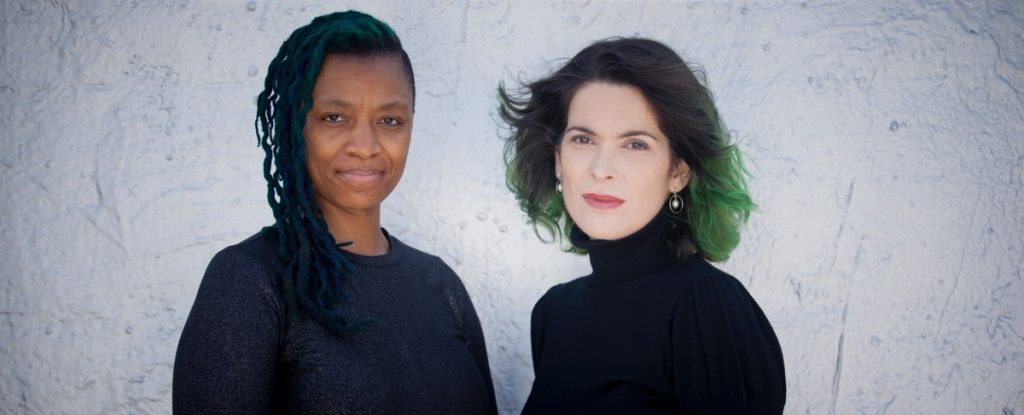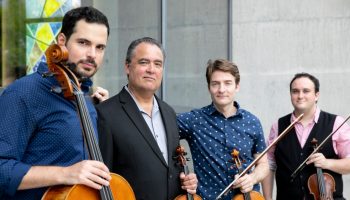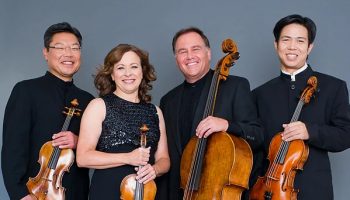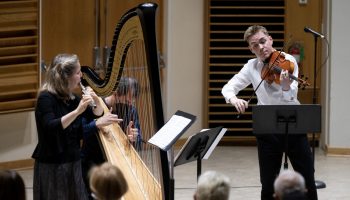
In each of the past two seasons, Chautauquans have seen a performance from Cristina Pato, with her signature green hair and bagpipes in hand. But Monday’s Chautauqua performance is designed to make one thing very clear: Those are only two surface-level lines in her story. It’s what can’t be seen from the stage that makes her who she is.
Pato, a gaita player, pianist and composer, will be joined by Mazz Swift, violinist and freestyle composition artist, to perform an improvisation of their original project “Invisible(s)” at 4 p.m. EDT Monday, June 29, on CHQ Assembly’s Video Platform. The performance will open the new weekly Chamber, Concert and Conversation series.
In 1999, Pato became the first female gaita, or bagpipe, player to release a solo album and has since become world-renowned for her unique sound. Pato said she realizes Chautauquans have come to know her as the “one who brings the bagpipes,” but for this digital performance, she will be seated at her living room piano.
“Everything about this performance is new, but even more than it’s new, this performance is exciting,” Pato said.
Swift is best known for her combination of composition and improvisation called MazzMuse, but she is also a singer, arranger and Juilliard-trained violinist who has performed and recorded with artists including Whitney Houston, Nicole Mitchell’s Mandorla Awakening and The Silkroad Ensemble, where she met Pato in 2018.
Shortly after meeting, Pato and Swift realized they were individually working on a collective goal: “Find what is invisible and allow it to be seen,” Pato said.
“When I met Mazz, she had just shared one of the pieces from her 16 Hits or Misses collection with me and when I heard it, it felt like I met Mazz, then I met her music and then I met the stories she carries,” Pato said. “The responsibility that she takes with her role as an artist is something I fell in love with.”
“16 Hits or Misses,” one of six pieces in the “Invisible(s)” program, is a collection created to recognize victims of police brutality and racism. It is an extension of “Invisible,” a piece Swift composed in 2013 to honor the life of Trayvon Martin, an unarmed, Black 17-year-old who was fatally shot near his Florida home by George Zimmerman, a neighborhood watch volunteer.
“I remember thinking I had to do something because George Zimmerman had just been acquitted and everyone was angry, but I was scared it was just going to be a big blitz on Facebook and then it would just go away,” Swift said. “I started writing music so I could get up in front of people, for as long as they would allow me to, and say these people’s names and tell their stories so they would not be forgotten.”
“Invisible(s)” includes personal pieces by both artists, such as Pato’s “My Lethe Story: The River of Forgetfulness,” which, to Pato, questions the role of human memory and collective identity. She composed “My Lethe Story” to process her mother’s struggle with dementia.
“Through this music, people are now seeing these invisible parts of me and my story for the first time,” Pato said. “What is visible for me, may be completely invisible for another person just because they are not part of the society I belong to. It doesn’t make you worse or better, it just makes you unaware. The realities Mazz described were invisible to me and it opened my eyes. I wanted to know what would happen if we kept asking people to open up their invisible worlds.”
With themes ranging from immigration to prison reform, the duo will perform a total of five selections. Swift and Pato decided to surprise each other with improvisations of each.
“This will certainly give us plenty to talk about afterwards,” Pato said.
Both artists will perform Dayna Lyn’s “Same Word Different Smile,” Octavio Vázquez’s “Meus Benqueridos Irmáns,” and Michi Wiancko’s “Plainsong for Jojo.” Swift will also perform Alisa Rose’s “You Can Fly.” Pato commissioned all four composers to write personalized pieces for “Invisible(s).”
Lastly, Pato will also perform Swift’s 2014 piece, “Life Afloat,” which Swift described as her “ode to the human spirit and how unexpected and powerful it is.”
Swift and Pato’s pre-recorded concert is the first of the 2020 season’s Chamber, Concert and Conversation series, the virtual adaptation of the Chautauqua Chamber Music Guest Artist Series.
“There are some Easter eggs in there, so to speak,” Swift said. “It takes way more energy and time to make these things happen than you would think. None of us are tech savvy — I will just leave it at that.”
The performances on CHQ Assembly’s Video Platform will last approximately 40 minutes and will be followed by a 20 minute Q-and-A session hosted by Deborah Sunya Moore, vice president of Performing and Visual Arts, and Timothy Muffitt, music director of the Music School Festival Orchestra.
Pato said her portions have their fair share of “Easter eggs” as well, but she, like Swift, is grateful for the opportunity to share “Invisible(s)” with anyone who will listen, regardless of how they tune in.
“We are not trying to change the world with this project,” Pato said. “We are just engaging in a conversation and trying to learn a little bit more about something another person is passionate about that we are not yet passionate about.”
This program is made possible by Bruce W. and Sarah Hagen McWilliams.




